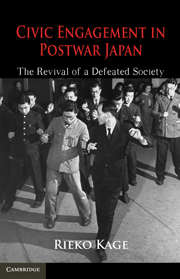Book contents
- Frontmatter
- Contents
- List of Tables
- List of Figures
- Preface
- Acknowledgments
- Civic Engagement in Postwar Japan
- 1 Introduction
- 2 Civic Engagement: The Dependent Variable
- 3 War and Civic Engagement: A Theoretical Framework
- 4 Quantitative Analysis: The Rise of Civic Engagement across Forty-Six Japanese Prefectures
- 5 The Long-Term Effects of Wartime Mobilization: Cross-National Analysis
- 6 Repression and Revival of the YMCA Japan
- 7 Wartime Endorsement and Postwar Repression of a Traditional Art
- 8 Civil Society and Reconstruction in Postwar Japan
- 9 Conclusions
- References
- Index
5 - The Long-Term Effects of Wartime Mobilization: Cross-National Analysis
Published online by Cambridge University Press: 06 December 2010
- Frontmatter
- Contents
- List of Tables
- List of Figures
- Preface
- Acknowledgments
- Civic Engagement in Postwar Japan
- 1 Introduction
- 2 Civic Engagement: The Dependent Variable
- 3 War and Civic Engagement: A Theoretical Framework
- 4 Quantitative Analysis: The Rise of Civic Engagement across Forty-Six Japanese Prefectures
- 5 The Long-Term Effects of Wartime Mobilization: Cross-National Analysis
- 6 Repression and Revival of the YMCA Japan
- 7 Wartime Endorsement and Postwar Repression of a Traditional Art
- 8 Civil Society and Reconstruction in Postwar Japan
- 9 Conclusions
- References
- Index
Summary
OVERVIEW
The previous chapter tested, on Japanese datasets, the validity of the argument that levels of civic engagement may rise dramatically in the wake of wars a) when wartime mobilization has equipped citizens with the skills that are necessary for participation and b) when the preexisting associational legacies provided fertile ground for the rapid expansion of civic activities. Higher levels of membership growth between 1945 and 1955 were seen in areas of Japan that had been more highly mobilized and which had exhibited relatively high levels of civic activities prior to war. These factors indeed propelled civic engagement to new heights once the war ended, regardless of how much physical or economic damage the region had incurred.
This chapter moves beyond the Japanese context and tests the broader applicability of the framework on data from thirteen countries that experienced World War II. Moving beyond the Japanese context also allows the study to test more explicitly for the validity of the victory/defeat hypothesis. Chapter 4 did test for the validity of one variant of the victory/defeat hypothesis: the idea that different levels of physical damage may produce the differential growth of civic engagement in the wake of wars. It found the empirical evidence for this hypothesis to be quite weak in the Japanese case. However, physical damage is not always synonymous with victory/defeat per se, which are national-level variables; while defeated countries may often incur higher levels of damage than victorious countries, the correlation is not perfect.
- Type
- Chapter
- Information
- Civic Engagement in Postwar JapanThe Revival of a Defeated Society, pp. 78 - 94Publisher: Cambridge University PressPrint publication year: 2010



